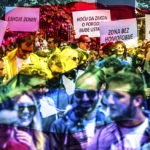Today marks an important day in the struggle for human rights in Kosovo. Following three consecutive marches on the International Day Against Homophobia and Transphobia (IDAHOT), many will take to the streets for the country’s first ever Pride Parade, called “In the Name of Love.” Its aim is to celebrate diversity, while at the same time protesting for legal rights for lesbians, gay men, bisexuals and transgender (LGBT) persons.
Here at K2.0, our support for LGBT rights has given us direct experience of the homophobic views that still prevail in our society. Back in 2012, our decision to challenge heteronormativity through our print magazine edition, Sex, offered one of the first in-depth journalistic investigations into the difficulties faced by LGBTI persons in Kosovo and across the region. The hate speech and violent attack at our publication launch demonstrated the pressing need to even more vocally articulate and defend not just human rights, but also free speech.
Five years later, in many respects much has changed. Today, outspoken and vocal public support for LGBT persons is much more present. Over the past few years, we have witnessed increased activism from civil society organizations and individuals advocating for the recognition that LGBT rights are human rights; there is increased pressure and requests from institutions to guarantee protection and equal opportunities; though the mainstream media generally still lack a comprehensive understanding of the struggles of LGBTI persons, they have also moved away from outright hate speech; and a number of cultural and artistic interventions have been produced, which seek to challenge ingrained traditional or conservative cultural norms in this regard.
Such developments are important to recognize, and throughout these past few years have contributed toward ensuring that LGBT-related issues have become part of the mainstream public discourse. However, the struggle for equality is continuous and never-ending. And the fight for LGBT rights in Kosovo still has a long way to go, whether at an institutional or societal level.
When referring to LGBTI persons, representatives from the political class have either used hate speech language or repeated monotonous, memorized statements about diversity and equality that lack sincerity. Moreover, in this election year, in both national and local election campaigns, all parties have failed to even mention LGBTI rights, let alone offer a position on issues, such as same-sex marriage, to take just one example.
On the few occasions that political representatives have joined the IDAHOT marches, they have done so only when holding high office, such as head of state. This has contributed to the existing perception in society at large — and a largely valid one — that their actions and reactions come only due to pressure from the international community.
That being said, their participation in the marches is without doubt of significant importance to LGBTI activists, as it helps to establish a precedent. But, for as long as such public commitments remain restricted to an annual ‘show’ of support, they will continue to be perceived as ingenuine acts and to add to the existing distrust human rights defenders bestow upon them for tackling equality in the long run.
Meanwhile, on the societal level, there are several widely-held beliefs that need to be debunked. One has to do with today’s event itself. As the Pride Parade was announced last week, despite the much support solicited across social media, many reactions also questioned why LGBT persons need a special day “just for the sake of being gay, lesbian, bisexual or transgender.”
Such backlashes do not only speak to the levels of non-acceptance or homophobia toward the LGBT community. They also point to the grave misconceptions toward the essence of what the fight for equality and human rights means.
Yes, pride parades are about celebrating LGBT culture and recognizing that LGBT persons are an equal part of society. But they are also always about making visible the need to continue to fight for rights in areas where such rights continue to be violated. Many people that have participated in the Kosovo marches to date have not been gay, lesbian or transgender themselves, but have joined as believers and defenders of human rights. Meanwhile, many LGBT persons that attend are still afraid to freely express their sexual orientation or gender identity because of the hatred-based backlash that they might face.
So Pride is just as much a response to that reality — an identity-based organizing for LGBT persons that provides for more power in the political struggle for equal rights. That is why the Pride Parade, just like any other demonstration or protest, needs to, and does, take place in the public space, as it is an important mechanism through which citizens reclaim their place in society.
Meanwhile, as a society we should also recognize that there is not one right that exceeds another in significance or priority. In fact, such arguments are most commonly made specifically when it comes to individuals or groups that are more vulnerable toward political, economic or social discrimination. They are generally grounded on narrow and exclusive ways of placing people within categories as “others” or “not like us”; the holders of such views assume that there is one way of being, and that they have the authority to define how others should feel or express their own identity.
That being said, it is also important to recognize that markers such as gender, race, ethnicity, class or sexual orientation also intersect, and result in very different experiences for different people. Diversity is not just a catchy word of the democratic process; it is about acknowledging and celebrating differences, but also taking them into account in order to ensure all citizens’ political, economic and social rights.
It falls upon journalists and the media to understand such complexities, and this monograph we publish today is a contribution to that ongoing struggle.K
Feature image: Atdhe Mulla / K2.0.

Back to LGBTI Monographs


